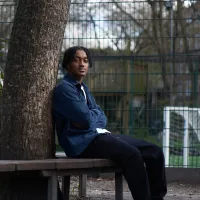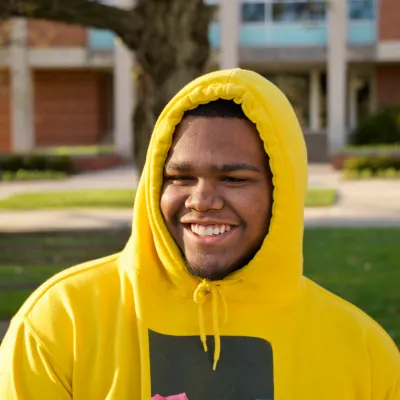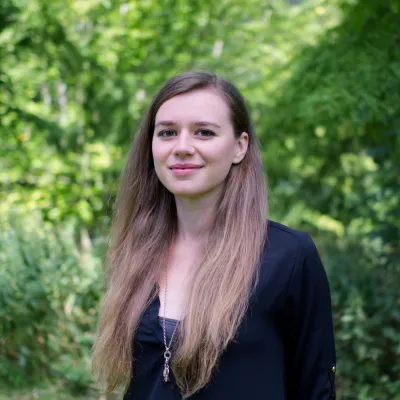Akhida, 26, came to the UK from Bangladesh at 16, following an arranged marriage. However, she soon had to flee her home due to domestic abuse and the council referred her to Centrepoint for floating support. Akhida is now working full time and looking to go to university to help her become a social worker.
Leaving her marriage and getting support
Akhida, 26, came to the UK from Bangladesh aged 16 with her husband, following an arranged marriage. However, she became homeless after she fled her abusive marriage and went to the council for support. The council were able to find her a flat and give her the support she needed to settle into her new home. She remembers how vital that support was during such an emotionally challenging time to help her find her feet.
She developed a close relationship with her social worker at the time, who was able to help her to develop new skills and provide her with emotional support. “He was really helping me – he helped me with money management, and then obviously mentally he was supporting me every month. He used to come every couple of months and see how I’m doing, and he used to help me with my studies and sometimes he would come to my appointments”.
She remembers how important it was to have someone to support her and help her settle into a new country, culture and language as she began to navigate independent life. “Obviously, because I was new, I didn’t know how to communicate in English as much and I didn’t know how to deal with these things as well. So, he was the one who helped me at first and told me how and where to start from”.
After taking time to settle with her new social worker and surroundings, he soon referred Akhida to Centrepoint for floating support as she became more established.
Navigating challenging relationships
After working closely with her social worker, Akhida developed a strong relationship with her Centrepoint key worker, Dushka, who provided her with floating support. She remembers how important this holistic support was at the time and the value of having someone she could speak to about what was happening, really helped her to cope.
“She was helping me with appointments, studying, jobs and sort of everything. She used to support me mentally and she was really great. I used to speak with her about everything and she would tell me what was happening. Mentally she would support me and that’s something I needed from a person”.
Although Akhida had a lot of relatives in the UK, after she fled her marriage and moved into her own home, she found that their relationships had changed. They began to treat her differently and blame her for what happened, which had a hugely negative impact on her mental health.
“Mentally I wasn’t really well. I was crying all of the time, really upset. I had no one, especially with what happened. I have lots of relatives in this country, but not that I’m close with and they’re really close”.
“It was so great working with Dushka and at that time I really needed somebody who can support me and understand me, because whoever was surrounding me they were actually judging me because of the domestic violence I did experience. People were like, maybe she is at fault or maybe she did this or that or didn’t do this. Everybody was judging me because I was living alone, and think I was doing something wrong. I come from a Muslim family, and we do think that if a woman is living alone, especially if they are still married or they don’t have a partner, this is when the things can be really negative”.
“I used to feel really bad and really sad when they would say these things because I was in that mental point that I could never think about a man again or think about getting married again. But I was in that state of mind and still people were saying that, and I was feeling really bad. Like why they would speak something like that behind me, or even in front of me”.
Having to cope with this reaction from her family was challenging and left her struggling with her mental health, whilst also balancing missing her home and parents. Not having her family’s support behind her, left her feeling that absence even more deeply. However, having the support of Dushka, acting as a parental figure, giving her advice and treating her with kindness, helped her to feel more at home and like she could move on.
“So, every moment I was feeling the absence of my parents, feeling that absence of not being in my home country and feeling so unvalued”.
“Dushka is the one who made me feel like I was home. She treated me like my mum, and I felt like I was speaking with someone who is my own person. Someone I can share everything and tell everything”.
Growing in independence
Whilst living in her council accommodation, Akhida remembered how important having support from Centrepoint was to help her develop skills around budgeting and money management, as well as independent living skills, especially as she was solely looking after her home.
“I was handling my house, and it was really difficult for me to handle all of this money management stuff and Dushka did help me with that as well”.
“I used to speak with someone from Centrepoint every week and she used to tell me how to spend my money and look at where I’m spending my money. If I had managed to save any money, she would help me with these things as well. I really needed that as well at that time, because I didn’t know how to manage these things. But finally, it did help me”.
Since moving into her council flat, she has had consistent issues with mould and with the water tank, which Dushka has been helping her to navigate and fix. It can also feel overwhelming having to advocate for yourself and to correspond to questions from the council, so Akhida has been grateful to have Dushka to speak on her behalf.
“I’ve been complaining to them many numerous times and they did email on behalf of me. Dushka was trying to help me with my water tank, because the water tank was stinking, and the water became unsafe. So, she did try and solve that issue, and it did get solved, thankfully”.
“I have a mould issue and it’s something I’m still continuously facing, and she would email on my behalf because they never listened to me so she helped me with emailing them and asking for help.”
Thinking about what comes next
Akhida currently works full time in an administration role in an office and is settling in well to her position. After the experiencing first hand the support of social workers and the impact that they can have, Akhida has been inspired to take this as a career path in her future.
“I’ve always wanted to be a social worker, and I was inspired from my social worker and from my experience of what I’ve been through. I’m talking about how they were able to support me is what actually inspired me to be a social worker”.
“I’ve always loved helping people and I didn’t know that when I was in my country, and I was really young and I didn’t know that there’s this sort of thing to have a way to help. I 100% admire them”.
In the last few years Akhida got remarried and has been supporting her husband with her salary as he tried to find a full time role. As soon as he gets his permanent role, she has a plan to start university and get the qualifications she needs to move into her dream career.
“I got remarried and because of that I actually started a new job because we got married in Bangladesh, so to bring him here I needed a job. So, at the moment, I’m working as an office administrator, and he is looking for a full-time job”.
“I’m just waiting for him to do a full-time job and then I can step ahead, come out from that job and then plan for my next job. I’ve completed my health and social care Level 3 and obviously my next step is university, which I couldn’t at the time because I had to bring my husband here. So, at the moment, I’m the one who has to handle all the household bills and stuff”.
Advice for other young people
Looking back over her own journey and what she has been through and overcome, Akhida has advice and guidance to share with other young people, that has helped her through challenging times.
“I would say, always listen to your heart. Whatever you’re feeling inside, you should always listen to your heart. No matter what, things will change, and you will have a better life. It’s not always going to stay at the same time and same point. Everything will change at a certain time. You will not understand at the point when it’s happening, and it might feel like the end of the world, but honestly it is not the end, and you will have a better life ahead.”
“It’s all about patience and just listen to your heart and try to motivate yourself. What I would say, is sometimes you just have to motivate yourself. I know there will be people who will motivate you, or who will try to put your down or will try to judge you, but that can motivate you, if you do it for yourself. Have patience and everything will be sorted. Nothing is permanent”.
We wish Akhida all the best with her future and can't wait for her to step into a social work role soon.

Make a donation
With your donation, we can help more young people like Akhida get the support they need to live and grow independently.




